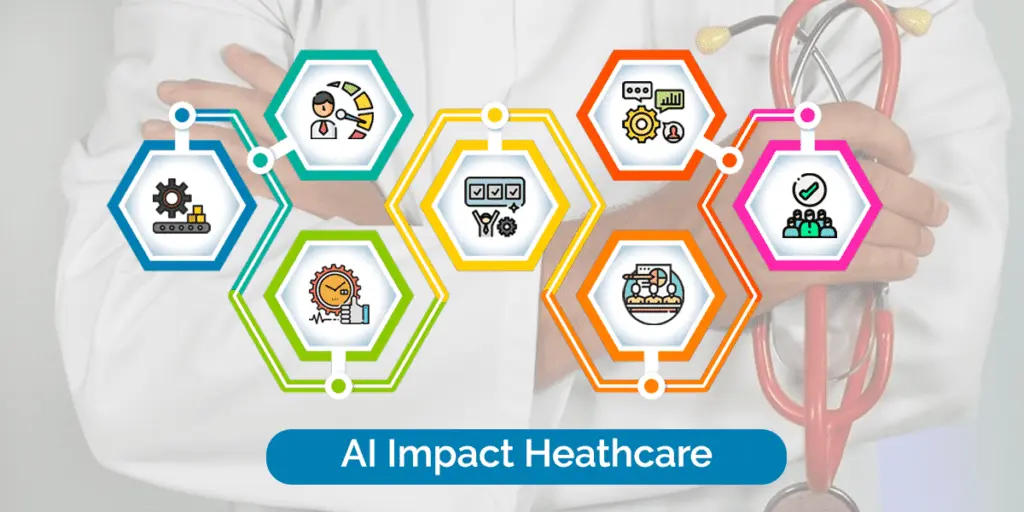AI in Healthcare is evolving at a faster rate. Artificial Intelligence is capable of detecting meaningful relationships in a data set and has been widely used in many healthcare facilities to diagnose, treat, and predict medical results.
The year 2019 was spent tracking the steady evolution of AI and other advanced technologies in the healthcare sector, paying close attention to how they could change patient care in the time to come. In this blog, we have listed the top and most compelling achievements of Artificial Intelligence in the Healthcare sector as witnessed by the year 2019.
How will AI Impact Radiology in another 10-15 years?

AI continues to evolve at a rapid pace, with new algorithms and solutions being developed all the time. What kind of long-term impact could these technologies have on patient care? What will radiology—and healthcare as a whole—look like in 2030 or 2035?
AI in Healthcare was in Chicago for RSNA 2019, speaking with researchers, vendors and other attendees about radiology’s close connection to AI.
Following are the answers recorded:
Imad B. Nijim, chief information officer, of MEDNAX Radiology Solutions, said-
“AI in radiology is just as impactful and transformational to our industry as when we moved from film to digital imaging. AI will permeate clinical informatics across all healthcare disciplines, with radiology having the most potential for innovation. First, AI will empower radiologists and impact the clinical practice by improving quality, reducing administrative burden, introducing a new level of image quantification and more. Second, AI will empower the administrators through the use of workflow models to ensure billing efficacy, procedure integrity and fraud detection.”
Karley Yoder, vice president and general manager of AI, GE Healthcare said,
“AI will radically transform radiology over the next 10 to 15 years, allowing clinicians to be much more efficient, accurate and available to spend time with the care team and their patients. This transformation will come as the industry learns how to efficiently unlock data and unleash intelligence.”
Gene Saragnese, CEO, MaxQ AI said,
“In radiology specifically, I think AI is moving us from a place where radiologists are interpreting images to one where they are diagnosing patients. That community does have a history of bringing IT solutions together to achieve a goal.”
Elad Walach, co-founder and CEO, Aidoc, said, “In the short term—say, the next five years—AI will be an augmenter and force multiplier, helping clinicians target their expertise via triage, acting as a ‘second reader’ or automating some routine tasks like measurement.
Hyun-Jun Kim, co-founder and chief strategy officer, VUNO said,
“I strongly believe that we will see AI making greater contributions to revolutionizing the entire aspects of clinical workflows, shifting its role from throughput-based applications to providing more individualized and personalized healthcare to patients. That is, AI-driven approaches will enable more rapid, consistent, robust and objective quantification of abnormalities in radiology, allowing medical professionals to diagnose diseases more efficiently and offer bespoke medical care through identifying the types and timing of medical exams a patient needs. This will ultimately lead to early detection and timely treatment of diseases reducing overall medical costs.”
How AI Impacted Hospital and Health system workforces?
The American Hospital Association’s 2019 report, AI and the Health Care Workforce examined the many ways providers can successfully integrate AI technologies. The report also explores how AI will be affecting the healthcare workforce, the care & the performance of physicians.
As per American Hospital Association, “Hospitals of the future will operate very differently than today thanks to the boom in AI.” The AHA’s Center for Health Innovation published a Market Insights report on how AI will impact health systems and hospitals.
Researchers have said 40% of tasks performed by nonclinical staff and 33% performed by clinical staff could be done by AI. While some tasks will be outsourced to technology, healthcare workers will see their roles change and evolve. With all these changes in mind, there are seven concrete ways the healthcare workforce will be impacted by AI, according to the AHA:
- Improve productivity, performance & efficiency
- Expand job responsibilities
- Practice at the top of the license
- Upskill & refrain staff
It won’t replace radiologists, but it should make them better physicians
Among all healthcare specialties, radiology has been impacted by AI technology. This trend is sure to carry on through 2020 and beyond. As per a journal published by the American College of Radiology, radiologists will see significant benefits from the continued rise of AI.
“If we sit back and do nothing, there is a chance we could be marginalized by AI,” wrote lead author Bibb Allen, MD, chief medical officer of the American College of Radiology Data Science Institute (ACR DSI), and colleagues. “On the other hand, if we play a leadership role in AI development, the best days for radiologists, our specialty and our patients are yet to come.”
Artificial Intelligence Identifies Schizophrenia with 87% Accuracy
In the start of 2019, healthcare sector witnesses the role of AI-powered software that can identify schizophrenia in MRI scans with 87% accuracy.
“Two individuals with the same diagnosis might still present different symptoms,” lead author Sunil Kalmady, PhD, said in a statement at the time. “This often leads to misdiagnosis. Machine learning, in this case, is able to drive an evidence-based approach that looks at thousands of features in a brain scan to lead to an optimal prediction.” He further added.
Sepsis- A major Health concern, can be predicted with an ML Algorithm
Research reveals that a machine learning algorithm is trained to predict the appearance of Sepsis- a major health concern, before time. The research noted that sepsis results in nearly 270,000 deaths annually throughout the United States. These algorithms show the potential to help a vast number of patients suffering from Sepsis.
Looking for AI integrated Healthcare app development solutions for your project? Connect to the industry experts at QSS Technosoft!
Boost your business productivity with ground-breaking Artificial Intelligence & Machine Learning solutions offered by QSS Technosoft! We specialize in applying artificial intelligence in the healthcare sector and develop AI/ML-equipped tailor-made solutions to meet your business requirements. Our expert AI team will automate your business processes by integrating AI/ML-based solutions that will transform the way your customers relate to your product.
We are proud to mention that our work has been recognized by leading B2B reviews and research platforms like GoodFirms, Clutch, MirrorView, and many more.
Image credits: Claude AI & Imgur

Most Effective Role of AI in Healthcare Industry